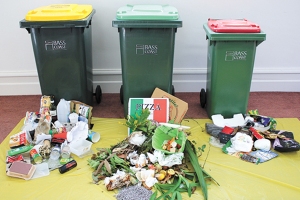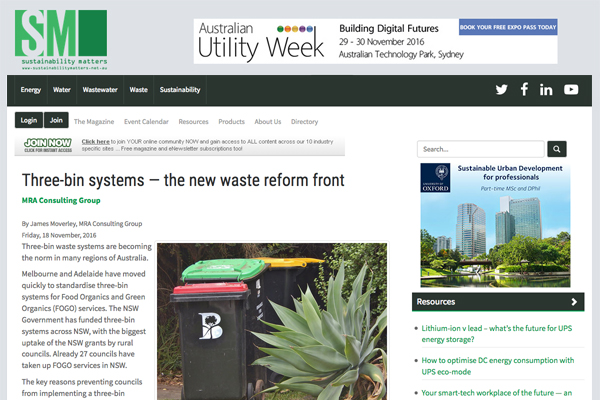3 bin systems – the new waste reform front
By James Moverley, MRA Consulting Group
Three bin waste systems are becoming the norm in many regions of Australia. Melbourne and Adelaide have moved quickly to standardise 3 bin systems for Food Organics and Green Organics (FOGO) services. The NSW government has funded 3 bin systems across NSW, with the biggest uptake of the NSW grants by rural councils. Already 27 councils have taken up FOGO services in NSW.
 The key reasons preventing councils from implementing a three bin kerbside service, are uncertainty in respect of: cost to council; cost per household; waste diversion; and demonstrable environmental benefits. But these questions can be answered via quantifiable and repeatable economic analysis.
The key reasons preventing councils from implementing a three bin kerbside service, are uncertainty in respect of: cost to council; cost per household; waste diversion; and demonstrable environmental benefits. But these questions can be answered via quantifiable and repeatable economic analysis.
Recently, Bass Coast Shire Council (BCSC) in Victoria engaged MRA with similar concerns over the introduction of a kerbside organics service. MRA performed a full feasibility study, including a quadruple bottom line assessment, to quantify all aspects of the implementation of a FOGO service. The outputs from the study provided BCSC with the information required to make an informed decision in regard to the introduction of such a service.
BCSC historical data was used to formulate the base assumptions for the study. A combination of industrial averages and data acquired from a recent green waste trial performed by BCSC were utilised to model the flow of both garden and food organics through a number of waste management scenarios.
To model the different options, MRA’s Consolidated Cost Model (CCM) was used to quantify all economic and environmental factors associated with waste collection, processing and disposal (Total cost; Diversion from landfill; Greenhouse gas emissions and Vehicle kilometres travelled).
A qualitative assessment of governance and social factors was also performed for each option to understand qualitative factors including integration with current waste infrastructure, community acceptability and how the option supports State and Council waste policies.
Combining the qualitative and quantitative assessments, MRA was able to recommend a full waste management system to BCSC, which included a three-bin system consisting of:
- 240L weekly FOGO collection (including kitchen caddies);
- 240L fortnightly recycling collection; and
- 120L fortnightly residual waste (garbage) collection.
Overall, this new FOGO system was projected to reduce Bass Coast Shire Council’s annual EPA Landfill Levy costs by at least $127,000 and reduce annual greenhouse gas emissions by over 2,600 tonnes of CO2. The diversion of FOGO would also reduce landfill consumption by 5,400m3 per year.
The additional cost to ratepayers of the new system, compared to the current 2 bin system, was calculated at less than $1 per week.
On the basis of MRA’s findings, BCSC went to tender for the system described above. The contract was awarded to Wonthaggi Recyclers Pty Ltd, with the final contract price coming within 3% of the CCM estimated price.
“Having MRA undertake a feasibility study gave Council an increased level of confidence in their decision making. MRA’s CCM took into account the parameters Council felt were important to consider and the community value, particularly the carbon accounting and net cost benefit.”
Bass Coast Shire Council
Mike Ritchie, MRA’s Director said “It is pleasing to hear that the CCM has again delivered an accurate representation of the final cost.”.
MRA has successfully delivered over 50 projects utilising the CCM for metro and regional councils across Australia. With the ability to tailor the CCM to account for the needs of the client, local waste processing options and technology innovations, MRA has a very accurate tool for modelling and options analysis.
Many councils then bundle the options analysis into a broader review of waste management considerations and release it as a draft waste management strategy for public comment. This brings the community on the waste reform journey with council.
For further information, please contact MRA at info@mraconsulting.com.au. As always, we welcome your feedback on this, or any other topic on ‘The Tipping Point’.
Image: South Gippsland Sentinel-Times
This article has been published by the following media outlets:





